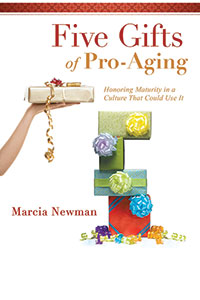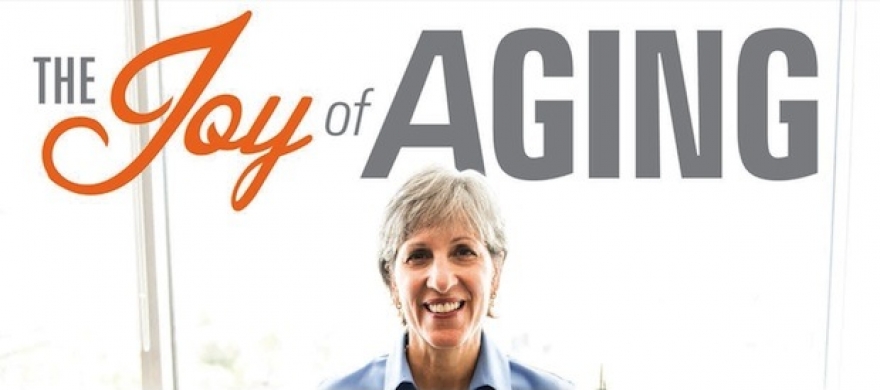The Joy of Aging
Alumna Marcia Newman (MA ’86) draws on her 30 years of experience in the mental health field and writes a fresh response to our anti-aging culture.
It started with my hair,” begins Marcia Newman, a licensed marriage and family therapist and program manager at the Betty Ford Center in West Los Angeles. The idea for her book, Five Gifts of Pro-Aging: Honoring Maturity in a Culture That Could Use It, came when she stopped dyeing her hair about 15 years ago.
“I thought it was no big deal, but I was not prepared for all the negativity,” she
continues. As she let her natural silver shine through, she was “confronted with this
shrieking voice inside that said, ‘You’re letting yourself go. What will people think?
They won’t value you.’”
While the debate over her hair loomed large in her mind, Newman saw similar trends
in her practice, where she has 30 years of experience in the mental health and addiction
recovery fields. She saw more and more women who were obsessed with trying to remain
young. Many of her clients were high-functioning women, yet they would not let themselves
face the fact that they were aging. Many were caught up in the “insatiable practice
of nip, tuck, and fill,” she explains.
The root of the problem, says Newman, is the prevailing anti-aging attitudes in our
culture.
“We are part of 78 million baby boomers who have changed the course of equal rights
and social empowerment for women and minorities around the world,” she writes in her
book. “Yet, take notice of how very narrow the range of acceptable looks for women
have become. In Southern California, the range is even narrower, stemming from a culture
of intense age phobia.” She points to other cultures and peoples throughout history who celebrated elders
and maturity.
She points to other cultures and peoples throughout history who celebrated elders
and maturity.
“Their voices and faces were valued for their expertise and wisdom,” she explains.
“That’s not the case in the U.S. We send older people to senior centers and retirement
homes.”
The population of older adults in our country is only growing. By 2023, one in five
Americans will be over the age of 65. Although there are fewer smokers in the boomer
generation than previous ones, Newman says boomers are more likely to suffer from
chronic pain, alcohol addiction, psychiatric problems, high blood pressure, high cholesterol,
and debilitating levels of stress.
“What we’re seeing here at the Betty Ford Center is that aging boomers are more prone
to treat their anxiety, depression, or chronic pain,” explains Newman of boomers who
can get caught up in an exertion/ exhaustion cycle. “They turn to alcohol, pharmaceuticals,
and other mood-altering methods.”
Addiction can sometimes come with age—men and women over 50 start metabolizing alcohol
and drugs differently due to decreased metabolic rate.
“At that point, the same one or two drinks can have an impact on the system equal
to what three or four did previously,” says Newman. “And they may have started adding
anxiety pills, pain pills, sleeping pills, or other medications that interact negatively
with one another.”
In fact, studies estimate that by 2020, as many as 5.7 million adults aged 50 and
older will have a substance use disorder. Newman says older adults also might be less
likely to seek treatment or realize they have a problem.
Newman helps adults heal from addiction every day at the Betty Ford Center, part of
the Hazelden Betty Ford Foundation, where she wears both the clinical hat and the
managerial hat. Licensed to practice in three states, she previously served at one
of the first houses for people with eating disorders in Los Angeles before working
in private practice for 25 years.
When she tells her clients they can overcome addiction, she speaks with authority.
“I went into mental health because I have a background in my family of mental health
issues and illness,” says Newman, who grew up in rural Wisconsin. “I developed my
own addictions with eating, with alcohol, and codependency. I’m grateful to have long-term
recovery myself.”
ecovering from addiction is only part of Newman’s pro-aging message. In her book,
she promotes what she calls the five gifts of pro-aging: authenticity, self-healing,
discernment, wildness, and collaboration. Within the chapters, she encourages men
and women to “do the inner- work” of embracing aging as a healthy part of life.
“If you live consciously, you will age more comfortably,” she promises. She also encourages
others to think about their own aging stereotypes.
“We need to confront the prolific social stigmas about growing older, especially the
message that women are valued only as long as we remain youthful looking,” she reflects.
“Pro-aging is choosing new, revolutionary roles for healthy maturity. Maturity is
about being wise, but it’s also about joy.”
